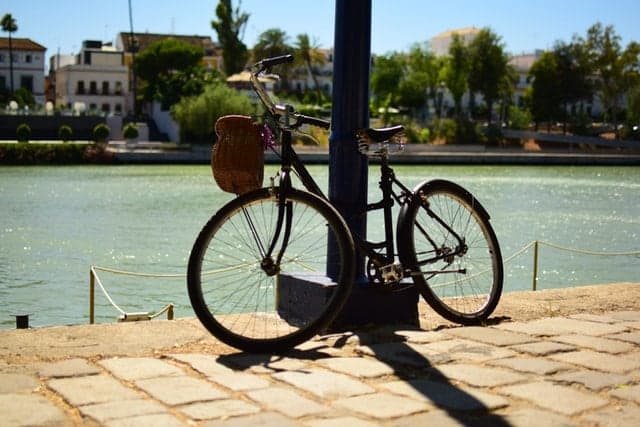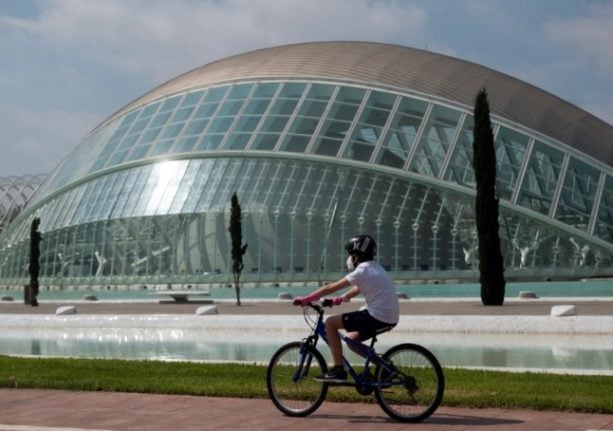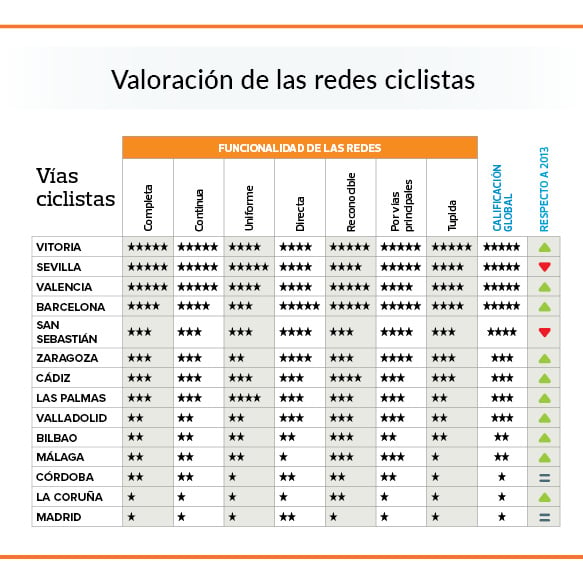REVEALED: Spain's most bike-friendly cities in 2022

If you're an avid cyclist who wants to move somewhere in Spain where you'll be able to safely ride around, or you're after a cycling city break, here are the most bike-friendly places in Spain.
In early 2022, Spain’s consumer rights group OCU carried out an in-depth study on the state of all things cycling in Spain’s major cities.
In all fourteen of Spain’s biggest and most well-known cities were included in the study, including analysis of cycle lanes, rental schemes, road safety and overall cycling infrastructure functionality.
City cycle routes were scored out of five stars on seven key criteria: completeness, continuousness, uniformity, directness, recognizableness, denseness, and the extent to which it passes through major thoroughfares.
The results might surprise you, so The Local has outlined the winners and losers: the Spanish cities with the best and worst cycling infrastructure overall, and where to go for the best cycle lanes, the safest cities, and the best rental schemes if you are visiting on a short trip.
The best 5
Vitoria - Vitoria in Spain’s northern Basque Country came out on top, taking the number one spot. Scoring full marks on all criteria except directness and uniformity, Vitoria was even given a full five-star rating on the global classification rating.
Seville - The Andalusia capital came a close second, scoring maximum marks on all criteria except directness and recognisability. Anyone who has visited Seville knows how popular the public bike rental scheme is, and the city’s flat terrain makes it a very popular mode of transport and fully worthy of its five-star global rating.
Valencia - Over on the other side of the country, Valencia came in at third and took full five-star marks in four out of the seven criteria. Valencia also achieved a five-star global rating, and scored well on all criteria, particularly completeness and continuousness, an impressive feat for such a big city. In fact, Valencia is the biggest city in the top three, after which there is a drop-off in scores.

Valencia in eastern Spain is among the most bike-friendly cities in the country. Photo: José Jordan/AFP
Barcelona - Barcelona also managed to get a full five-star rating internationally, but fell down on the uniformity and completeness criterias.
San Sebastián - Up in the Bay of Biscay, Basque Country’s San Sebastián rounded out the top five, taking a four-star rating in the global classification and strong ratings across the other criteria.
The worst 5
Madrid - Anyone who has lived, visited, or cycled in Madrid knows that being a cyclist in the capital city can be a dangerous existence. Now officially the worst bike city in Spain, Madrid scored poorly on almost all criteria: just one-star ratings on all six out of the seven criteria, with its sole two-star rating coming in directness. Madrid scored a one-star global classification overall, a very poor showing for a capital city.
A Coruña - Second bottom was the Galician city of A Coruña in north-western Spain. The Gallego city scored as poorly as Madrid, with its sole two-star rating coming for the recognisability of its cycle lanes. Like Madrid, A Coruña scored a one-star global rating.
Córdoba - Rounding out the bottom three is Andalusian city Córdoba, which although had a stronger showing that Madrid and A Coruña still scored fairly poorly on most criteria, scoring two-star ratings for five and just one-star for uniformity and
Málaga - Andalusian coastal city Málaga came in fourth from bottom, but scored a better overall classification than the bottom three by taking a two-star global rating. Málaga even took three-stars in the recognisability and connectivity to major thoroughfare criterias, but fell down on the directness of its cycle lanes, meaning cyclists often had to tae detours.
Bilbao - The best of the worst, Bilbao also scored a two-star overall rating, and the Basque Country city had two-star ratings across the board except for recognisability, where it managed to get three-stars.

OCU's ranking of most and least bike-friendly cities in Spain according to several categories rating their cycle lane network . Source: OCU
READ ALSO: 12 cycling fines you need to watch out for in Spain
Bike-friendly categories
Rental schemes and parking spaces
The OCU also considered how accessible and safe bicycle parking facilities were in each city, and that each has a bike rental system or scheme that allows people without their own bike to travel across the city.
The OCU considered it important that bicycle car-parks are located close to transport interchanges (in order to be able to change modes of transport easily at bus and train stations) and that they are readily available and recognisable in city centres, university areas and other heavily populated places like shopping centers
In La Coruña there is nowhere to park a bike in the city centre, and in Bilbao, Cádiz, San Sebastián, Valladolid and Zaragoza they only really exist at train stations.
According to the OCU, the cities with the best parking options and rental systems were Seville, Valencia and Barcelona, according to a calculation of ‘rental points’ against population, location and price per use. Seville and Valencia are the cities with the most rental points per 100,000 inhabitants, meaning they are the Spaniards that make the most use of their public bike schemes.
Cycle lanes
Unsurprisingly, the cities with the best cycle lanes are those that scored best overall. The cities with the best cycle lanes (both in terms of recognisability and scope) were Vitoria, Seville and Valencia, who have made continued good progress in improving their network of cycle paths and even extending them.
On the other hand, Cádiz, Valladolid and Las Palmas have also improved a lot in recent years, improving their scores, but among the cities with the worst results, Madrid and Córdoba stand out, and have hardly improved over the years despite the number of cyclists on their streets (particularly those on electric bikes in Madrid) has increased.
READ ALSO:
- How Barcelona’s ‘bike bus’ scheme for schoolkids is getting noticed worldwide
- Seven reasons why Barcelona is best seen by bicycle
Comments
See Also
In early 2022, Spain’s consumer rights group OCU carried out an in-depth study on the state of all things cycling in Spain’s major cities.
In all fourteen of Spain’s biggest and most well-known cities were included in the study, including analysis of cycle lanes, rental schemes, road safety and overall cycling infrastructure functionality.
City cycle routes were scored out of five stars on seven key criteria: completeness, continuousness, uniformity, directness, recognizableness, denseness, and the extent to which it passes through major thoroughfares.
The results might surprise you, so The Local has outlined the winners and losers: the Spanish cities with the best and worst cycling infrastructure overall, and where to go for the best cycle lanes, the safest cities, and the best rental schemes if you are visiting on a short trip.
The best 5
Vitoria - Vitoria in Spain’s northern Basque Country came out on top, taking the number one spot. Scoring full marks on all criteria except directness and uniformity, Vitoria was even given a full five-star rating on the global classification rating.
Seville - The Andalusia capital came a close second, scoring maximum marks on all criteria except directness and recognisability. Anyone who has visited Seville knows how popular the public bike rental scheme is, and the city’s flat terrain makes it a very popular mode of transport and fully worthy of its five-star global rating.
Valencia - Over on the other side of the country, Valencia came in at third and took full five-star marks in four out of the seven criteria. Valencia also achieved a five-star global rating, and scored well on all criteria, particularly completeness and continuousness, an impressive feat for such a big city. In fact, Valencia is the biggest city in the top three, after which there is a drop-off in scores.

Barcelona - Barcelona also managed to get a full five-star rating internationally, but fell down on the uniformity and completeness criterias.
San Sebastián - Up in the Bay of Biscay, Basque Country’s San Sebastián rounded out the top five, taking a four-star rating in the global classification and strong ratings across the other criteria.
The worst 5
Madrid - Anyone who has lived, visited, or cycled in Madrid knows that being a cyclist in the capital city can be a dangerous existence. Now officially the worst bike city in Spain, Madrid scored poorly on almost all criteria: just one-star ratings on all six out of the seven criteria, with its sole two-star rating coming in directness. Madrid scored a one-star global classification overall, a very poor showing for a capital city.
A Coruña - Second bottom was the Galician city of A Coruña in north-western Spain. The Gallego city scored as poorly as Madrid, with its sole two-star rating coming for the recognisability of its cycle lanes. Like Madrid, A Coruña scored a one-star global rating.
Córdoba - Rounding out the bottom three is Andalusian city Córdoba, which although had a stronger showing that Madrid and A Coruña still scored fairly poorly on most criteria, scoring two-star ratings for five and just one-star for uniformity and
Málaga - Andalusian coastal city Málaga came in fourth from bottom, but scored a better overall classification than the bottom three by taking a two-star global rating. Málaga even took three-stars in the recognisability and connectivity to major thoroughfare criterias, but fell down on the directness of its cycle lanes, meaning cyclists often had to tae detours.
Bilbao - The best of the worst, Bilbao also scored a two-star overall rating, and the Basque Country city had two-star ratings across the board except for recognisability, where it managed to get three-stars.

READ ALSO: 12 cycling fines you need to watch out for in Spain
Bike-friendly categories
Rental schemes and parking spaces
The OCU also considered how accessible and safe bicycle parking facilities were in each city, and that each has a bike rental system or scheme that allows people without their own bike to travel across the city.
The OCU considered it important that bicycle car-parks are located close to transport interchanges (in order to be able to change modes of transport easily at bus and train stations) and that they are readily available and recognisable in city centres, university areas and other heavily populated places like shopping centers
In La Coruña there is nowhere to park a bike in the city centre, and in Bilbao, Cádiz, San Sebastián, Valladolid and Zaragoza they only really exist at train stations.
According to the OCU, the cities with the best parking options and rental systems were Seville, Valencia and Barcelona, according to a calculation of ‘rental points’ against population, location and price per use. Seville and Valencia are the cities with the most rental points per 100,000 inhabitants, meaning they are the Spaniards that make the most use of their public bike schemes.
Cycle lanes
Unsurprisingly, the cities with the best cycle lanes are those that scored best overall. The cities with the best cycle lanes (both in terms of recognisability and scope) were Vitoria, Seville and Valencia, who have made continued good progress in improving their network of cycle paths and even extending them.
On the other hand, Cádiz, Valladolid and Las Palmas have also improved a lot in recent years, improving their scores, but among the cities with the worst results, Madrid and Córdoba stand out, and have hardly improved over the years despite the number of cyclists on their streets (particularly those on electric bikes in Madrid) has increased.
READ ALSO:
- How Barcelona’s ‘bike bus’ scheme for schoolkids is getting noticed worldwide
- Seven reasons why Barcelona is best seen by bicycle
Join the conversation in our comments section below. Share your own views and experience and if you have a question or suggestion for our journalists then email us at [email protected].
Please keep comments civil, constructive and on topic – and make sure to read our terms of use before getting involved.
Please log in here to leave a comment.